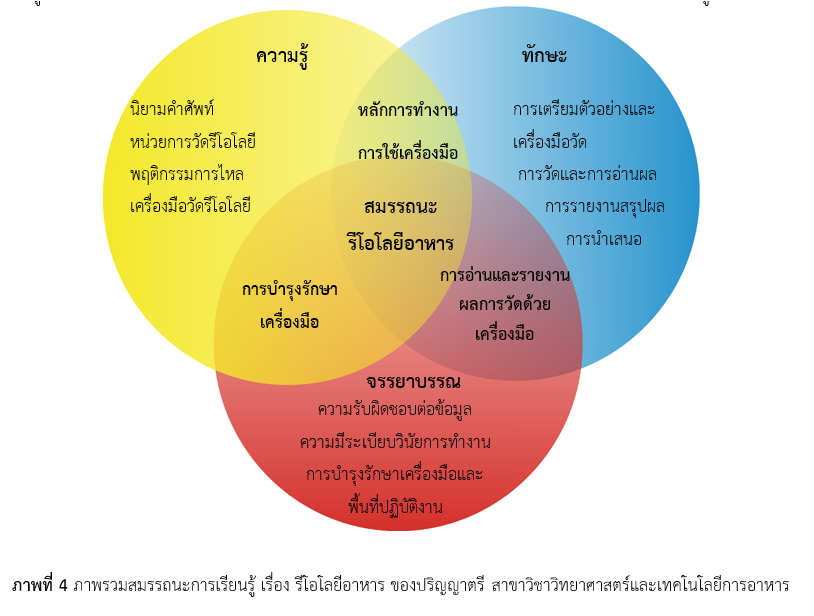การพัฒนาสมรรถนะรีโอโลยีอาหาร โดยใช้การจัดการเรียนรู้เชิงรุกร่วมกับอุตสาหกรรมอาหาร ของนักศึกษาปริญญาตรีชั้นปีที่ 4 สาขาวิชาวิทยาศาสตร์และเทคโนโลยีการอาหาร คณะเทคโนโลยีการเกษตร มหาวิทยาลัยราชภัฏเชียงใหม่
Main Article Content
บทคัดย่อ
การวิจัยเรื่องนี้มีวัตถุประสงค์เพื่อสำรวจความต้องการของอุตสาหกรรมอาหารเรื่อง รีโอโลยีอาหาร หรือ วิทยาศาสตร์การไหล เพื่อนำผลสำรวจมาออกแบบการจัดการเรียนรู้บนฐานสมรรถนะเชิงรุก และเพื่อวัดและประเมินการใช้รีโอโลยีอาหาร ในอุตสาสาหกรรมอาหาร กลุ่มเป้าหมายคือ นักศึกษาปริญญาตรีชั้นปีที่ 4 สาขาวิชาวิทยาศาสตร์และเทคโนโลยีการอาหาร คณะเทคโนโลยีการเกษตร มหาวิทยาลัยราชภัฏเชียงใหม่ ปีการศึกษา 2564 จำนวน 24 คน เครื่องมือที่ใช้ในการวิจัย ได้แก่ 1) แบบสอบถามความต้องการของอุตสาหกรรมอาหารเรื่อง รีโอโลยีอาหาร 2) รายละเอียด รายวิชาหลักการวิเคราะห์อาหาร รายวิชาการเตรียมฝึกสหกิจศึกษา และสหกิจศึกษา และ 3) แบบประเมินสมรรถนะรีโอโลยีอาหาร จำนวน 15 ข้อ การวิเคราะห์ข้อมูลด้วยค่าเฉลี่ย เทียบกับเกณฑ์คุณภาพและมาตรฐานที่อุตสาหกรรมอาหารต้องการ ผลการวิจัย พบว่า อุตสาหกรรมอาหารต้องการสมรรถนะรีโอโลยี 3 ด้าน ได้แก่ 1) หลักการและการใช้งานเครื่องมือวัดรีโอโลยี 2) การอ่านผลและการแปลผลการวัดรีโอโลยี และ 3) การประยุกต์พัฒนางานอาหารด้วยรีโอโลยี ดังนั้น การออกแบบการเรียนรู้บนฐานสมรรถนะจากเกลียววิจัยเชิงปฏิบัติการจีงแบ่งเป็น 3 ขั้น ได้แก่ 1) ขั้นพื้นฐาน หลักการวิเคราะห์เน้นทฤษฎีและหลักการวัดรีโอโลยี 2) ขั้นฝึกทักษะ การเตรียมฝึกประสบการณ์วิชาชีพให้ผู้เรียนได้นำหลักรีโอโลยีมาควบคุมคุณภาพผลิตภัณฑ์อาหาร และ 3) ขั้นประยุกต์ นักศึกษาทำโครงงานสถานประกอบการที่มีหลักการรีโอโลยีเกี่ยวข้อง สมรรถนะเชิงรุกของผู้เรียนรีโอโลยีในระดับขั้นพื้นฐานและขั้นฝึกฝนมีการพัฒนาขึ้น และสถานประกอบการประเมินการนำรีโอโลยีของนักศึกษาไปประยุกต์ใช้ในโครงงานสถานประกอบการในระดับ B (ดี) โดยค่าเฉลี่ยสูงสุดสมรรถนะรีโอโลยีขั้นพื้นฐาน (𝑥̅= 3.54) ขั้นฝึกฝน (𝑥̅= 3.44) และขั้นประยุกต์ ((𝑥̅= 3.82) ดังนั้น ผู้ใช้บัณฑิตในอุตสาหกรรมอาหารมีบทบาทในการกำหนดสมรรถนะที่จำเป็นของบัณฑิตเพื่ออุดมศึกษานำออกแบบการจัดการเรียนรู้พัฒนาสมรรถนะทางวิชาชีพของนักศึกษา
Article Details

อนุญาตภายใต้เงื่อนไข Creative Commons Attribution-NonCommercial-NoDerivatives 4.0 International License.
วารสารวิทยาศาสตร์และวิทยาศาสตร์ศึกษา (JSSE) เป็นผู้ถือลิสิทธิ์บทความทุกบทความที่เผยแพร่ใน JSSE นี้ ทั้งนี้ ผู้เขียนจะต้องส่งแบบโอนลิขสิทธิ์บทความฉบับที่มีรายมือชื่อของผู้เขียนหลักหรือผู้ที่ได้รับมอบอำนาจแทนผู้เขียนทุกนให้กับ JSSE ก่อนที่บทความจะมีการเผยแพร่ผ่านเว็บไซต์ของวารสาร
แบบโอนลิขสิทธิ์บทความ (Copyright Transfer Form)
ทางวารสาร JSSE ได้กำหนดให้มีการกรอกแบบโอนลิขสิทธิ์บทความให้ครบถ้วนและส่งมายังกองบรรณาธิการในข้อมูลเสริม (supplementary data) พร้อมกับนิพนธ์ต้นฉบับ (manuscript) ที่ส่งมาขอรับการตีพิมพ์ ทั้งนี้ ผู้เขียนหลัก (corresponding authors) หรือผู้รับมอบอำนาจ (ในฐานะตัวแทนของผู้เขียนทุกคน) สามารถดำเนินการโอนลิขสิทธิ์บทความแทนผู้เขียนทั้งหมดได้ ซึ่งสามารถอัพโหลดไฟล์บทความต้นฉบับ (Manuscript) และไฟล์แบบโอนลิขสิทธิ์บทความ (Copyright Transfer Form) ในเมนู “Upload Submission” ดังนี้
1. อัพโหลดไฟล์บทความต้นฉบับ (Manuscript) ในเมนูย่อย Article Component > Article Text
2. อัพโหลดไฟล์แบบโอนลิขสิทธิ์บทความ (Copyright Transfer Form) ในเมนูย่อย Article Component > Other
ดาวน์โหลด ไฟล์แบบโอนลิขสิทธิ์บทความ (Copyright Transfer Form)
เอกสารอ้างอิง
Anderson, L. W. and Krathwohl, D. R. (Eds.) (2001). A taxonomy for Learning, teaching, and assessing: A revision of Bloom’s taxonomy of educational objectives. New York: Addison Wesley Longman.
Bangkokbiznews. (2020). 10 Essential competencies that workers must have (in Thai). Retrieved 11 March 2023, from Bangkokbiznews: https://www.bangkokbiznews.com/social/906516
Barman, A. and Konwar, J., (2011) Competency-based curriculum in higher education: A necessity grounded by globalization. Romanian Journal for Multidimensional Education, 3(6), 7-15.
Bloom, B. S. (Ed.), Engelhart, M.D., Furst, E.J., Hill, W.H. and Krathwohl, D.R. (1956). Taxonomy of educational objectives: Handbook I: Cognitive domain. New York: David McKay.
Chelli, S. (2011). The competency-based approach in higher education. Revue des Sciences Humanities, 22, 21-31.
Elsevier. (2021). University-industry collaboration: a closer look for research leader. Retrieved 11 March 2023, from Elsevier: https://www.elsevier.com/research-intelligence/university-industry-collaboration
Jangsawang, P., Pongsophon, P., Jantarakantee, E. and Tanak, A. (2022). Assessment for learning and assessment as learning: Revised assessment in science learning model (in Thai). Journal of Science and Science Education, 5(2), 332-340.
Kumpang, P. and Wattanachai, S. (2021). The validation of constructivist learning environments model cooperate simulation to enhance problem-solving for veterinary students (in Thai). Journal of Science and Science Education, 4(2), 231 – 243.
Kulik, A. A., Lazareva, P. V., Ippolitova, N. V., Egorova, A. E. and Nedorezova, O. Yu. (2020). Competency-based approach and competencies in higher education: a theoretical review. Propósitos y Representaciones, 8(2), 38.
Muller, H. G. and Ward, A. G. (1974). The teaching of food rheology. Journal of Texture Studies, 5(3), 263-266.
Muller, H. G. (1985). Undergraduate teaching of food rheology at the University of Leeds. Rheology Acta, 24, 438-440.
Office of the Education Council. (2020). Actively competency-based learning management (in Thai). Bangkok: Ministry of Education.
Panyoyai, N. (2023). Work competencies of bachelors in food science and technology and higher education development guidelines for the needs of graduate users in northern Thailand (in Thai). Journal of the Association of Researchers, 28(1), 90-118.
Phoodee, W. (2023). The development teamwork and collaboration competence of learners using the 6E model in STEM education merge with the BCG economic model for grade-7 students in Chumchon Bankampok Thadokkeaw school (in Thai). Journal of Science and Science Education, 6(1), 105-119.
Platteel, T., Hulshof, H., Ponle, P., Van Driel, J. and Verloop, N. (2010). Forming a collaborative research partnership. Educational Action Research, 18(4), 429-451.
Prachachat. (2020). Fast mission of Ministry of Higher Education, Science, Research and Innovation to solve the problem of unemployed graduates-towards the internationalization of research (in Thai). Retrieved 11 March 2023, from Prachachat https://www.prachachat.net/education/news-516744
Sanno, A., Oberg, A. F., Flores-Garcia, E. and Jackson, M. (2019). Increasing the impact of industry-academia collaboration through co-education. Technology Innovation Management Review, 9(4), 37-47.
Tacettin, A. and Mustafa Cem, B. (2021). Competency-based education: theory and practice. Psycho-Educational Research Reviews, 10(3), 67-95.
Tattiyakul, J. (2014). Food rheology (in Thai). Bangkok: Chulalongkorn University Press.
Thansettakij. (2020). Food Industry in a new context after COVID-19 (in Thai). Retrieved 11 March 2023, from Thansettakij: https://www.thansettakij.com/columnist/435604
Vermant, J., Leuvon, K. U. and Macosko, C. (2008). Teaching rheology using product design. Rheology Bulletin, 77(2), 8-13.
Vernon, J. H. C. (1966). The teaching of rheology: An account of a symposium held by the British Society of Rheology. Rheology Acta, 5(1), 61-63.
Wang, C., Ke, Y., Wu, J. and Hsu, W. (2012). Collaborative action research on technology integration for science learning. Journal of Science Education and Technology, 21, 125-132.
Wattananarong, K. (2013). Vocational competency (in Thai). Retrieved 12 March 2023, from Kroobannok: https://www.moe.go.th/สมรรถนะวิชาชีพ-vocational-competency/
Wongwanich, S. (2011). Classroom action research (in Thai). 5th edition Bangkok: Chulalongkorn University Press.


